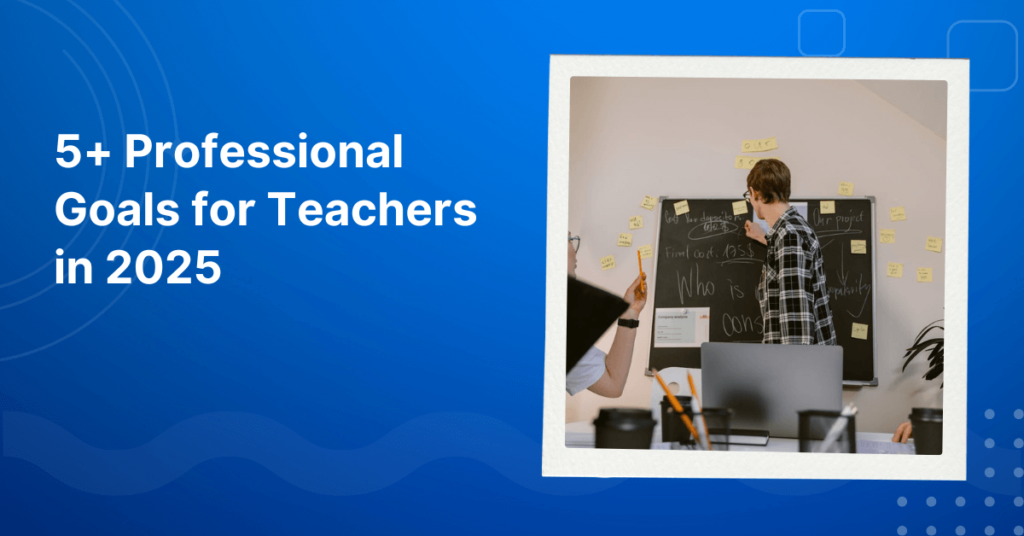
5+ Professional Goals for Teachers in 2026
As a teacher, setting career goals isn’t just about moving up the ladder; it’s about helping students grow and succeed too. Knowing the different types of goals you can set helps you create a well-rounded plan for your professional growth. It’s all about balancing short-term educational goals with long-term aspirations, making sure that each goal you set leads to a rewarding teaching career and a positive impact on the education system. Let’s explore various educational goals with VTJ in the article below!

Professional development goals
These goals focus on expanding your knowledge and teaching skills. They may include pursuing an advanced degree, attending workshops on new teaching techniques, or learning to use educational technology effectively. The idea is to keep growing as a lifelong learner, bringing new ideas and skills to your classroom that will benefit your students.
For example
you might decide to pursue a master’s degree in education to deepen your understanding of curriculum design. Or, you could attend workshops on innovative teaching techniques, like project-based learning, to bring fresh ideas to your classroom. Learning to effectively use educational technology, like integrating interactive tools into your lessons, is another great goal. The idea is to keep growing as a lifelong learner, so you can continually bring new ideas and skills to your students.
Discover Related Guides: 14 Types of teaching methods for an effective lesson
Student achievement goals
These goals are all about your students’ success and can be some of the most fulfilling. You might set targets for student performance, develop strategies to support different learning needs, or try out new ways to assess students. By focusing on student achievement, you’re not only helping students grow but also demonstrating your effectiveness and dedication as a teacher.
For instance, you might set a goal to increase the percentage of students who achieve proficiency in reading by the end of the year. You could develop targeted strategies, like creating small reading groups for different skill levels, to support diverse learning needs.
Curriculum development goals
Curriculum goals involve shaping or updating the educational content to better meet student needs and standards. This could mean adding interdisciplinary approaches, making lessons more culturally relevant, or leading a team to review the curriculum. These goals give you a chance to ensure that what’s being taught is engaging, relevant, and comprehensive.
For example
you might add interdisciplinary approaches to your lessons, like combining history with literature to make the content more engaging. You could work on making lessons more culturally relevant, such as incorporating local history or diverse perspectives into the curriculum. Leading a team to review and update the curriculum to ensure it’s aligned with current educational standards is another way to make sure what’s being taught is comprehensive and meaningful.
Community and collaboration goals
These goals highlight the importance of building strong relationships with colleagues, parents, and the community. You might lead a community outreach project, build partnerships with local organizations, or initiate a professional learning community at your school. These efforts help create a supportive and inclusive learning environment that reaches beyond the classroom.
For instance, you could lead a community outreach project, like organizing a school-wide volunteer day to build connections with local organizations. You might also build partnerships with local businesses to create internship opportunities for students.
Leadership and advocacy goals
Leadership and advocacy goals involve assuming roles that influence educational policies and practices. You might aim to become a department head, get involved in teacher unions, or push for policy changes that benefit both students and teachers. By pursuing these goals, you can extend your influence beyond your classroom, driving positive changes in the broader education landscape.
For example
you might aim to become the head of your department, where you can lead curriculum planning and mentor other teachers. You could also get involved in teacher unions to advocate for better working conditions and resources. Another goal could be pushing for policy changes at the school or district level, such as advocating for more mental health support for students.
Continue Learning: Teacher Strengths and Weaknesses: How to Answer?
FAQs

What is a professional practice goal in teaching?
A Professional Practice (PP) goal is essentially an action plan for teachers, focusing on the teacher’s intended actions rather than specific student outcomes. These goals can target different areas of teaching, such as:
- Creating a positive classroom environment: Developing an inclusive classroom culture where every student feels respected and supported.
- Implementing evidence-based practices: Effectively incorporating technology into lessons to make learning more engaging and impactful.
- Applying research-based techniques: Using teaching strategies that have been proven effective through research.
- Building relationships: Forming strong bonds with students and their families to better support the learning process.
Setting these goals helps teachers remain focused, motivated, and effective, fostering their professional development while contributing to student success.
How do you write a professional goal statement for a teacher?
Choose your focus area: Identify the specific aspect of your teaching you want to improve. This could be anything from student performance and classroom management to teaching methods or your own professional development.
Apply the SMART criteria: Make sure your goal meets the following:
- Specific: Clearly outline what you aim to achieve.
- Measurable: Decide how you’ll track your progress.
- Achievable: Set a goal that is realistic and within reach.
- Relevant: Ensure the goal is meaningful and aligns with what you want to accomplish.
- Time-bound: Establish a clear deadline for when you want to achieve it.
See More Strategies: 22+ SMART Teacher Goals Examples in 2026
Craft your goal statement: Bring all these elements together into a clear and straightforward statement. For example:
Example goal statement: By the end of this school year, I aim to boost student engagement by integrating interactive tech tools, like educational apps and online collaboration platforms, into my lessons. I’ll track progress through student feedback surveys and monitor participation levels in class activities.
How to track and evaluate the progress of achieving goals
- Break down your goals: Take each goal and split it into smaller, actionable steps. For instance, if you’re aiming for a promotion, you could focus on hitting monthly targets, getting a certification, and taking on extra responsibilities. Breaking things down makes your goals feel more achievable and helps you track your progress.
- Set realistic deadlines: Once you’ve outlined your tasks, set deadlines that make sense. Factor in your other commitments so you’re not overwhelmed, and give yourself enough time to reach each goal without added pressure.
- Check your progress regularly: Make it a routine to check in on your progress, whether it’s weekly or even daily. See what you’ve accomplished and whether you’re on track. This helps you stay motivated and allows you to tweak your goals or deadlines if necessary.
Stick to a schedule: Keep yourself on track by creating a schedule. Use a planner or a calendar app to map out key dates and deadlines. Review it daily to stay accountable and ready for what’s ahead.
By setting and pursuing diverse career goals, you can cultivate a rich and evolving career that advances your professional development while making a lasting impact on your students and the quality of education they receive.






